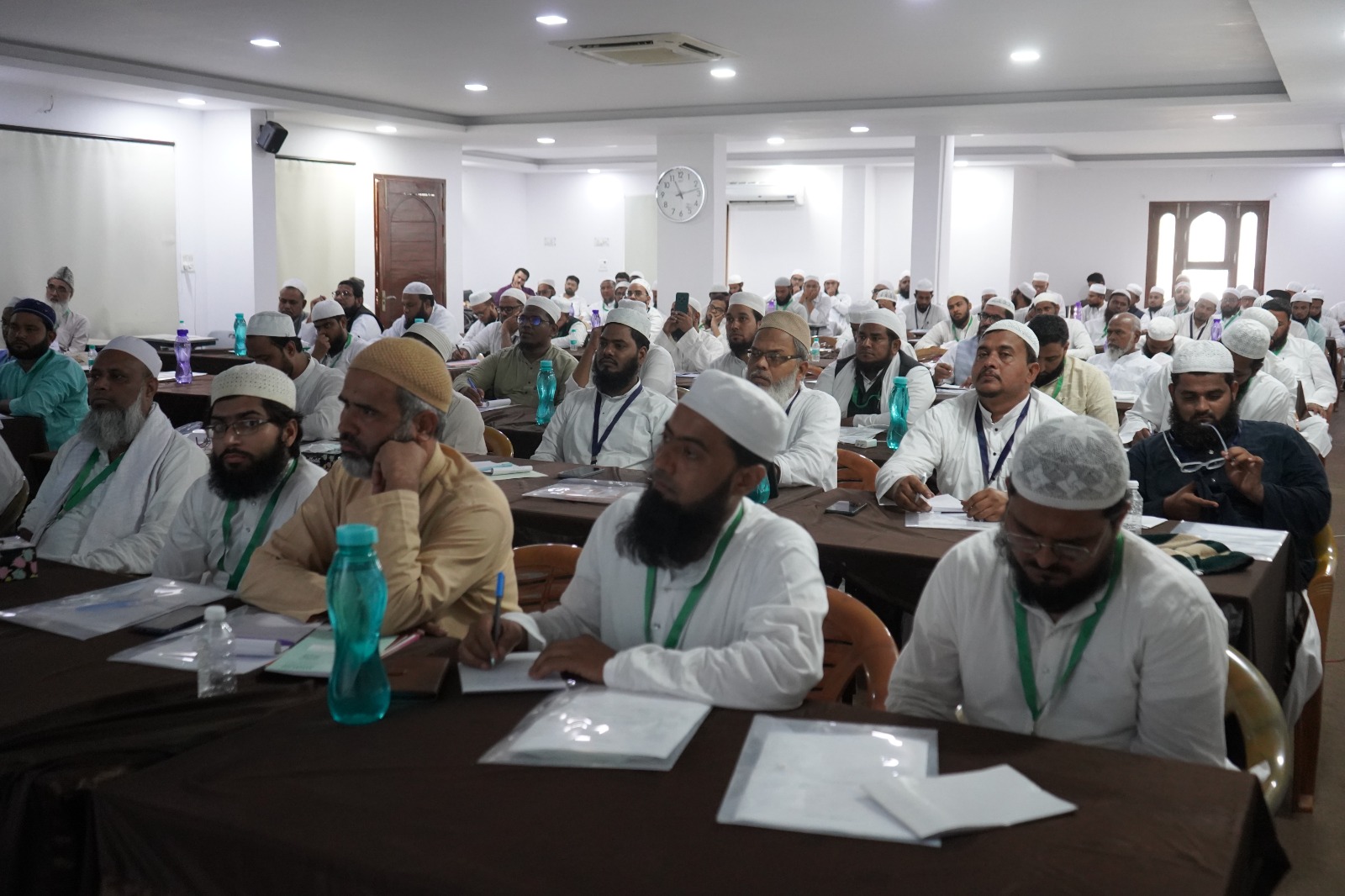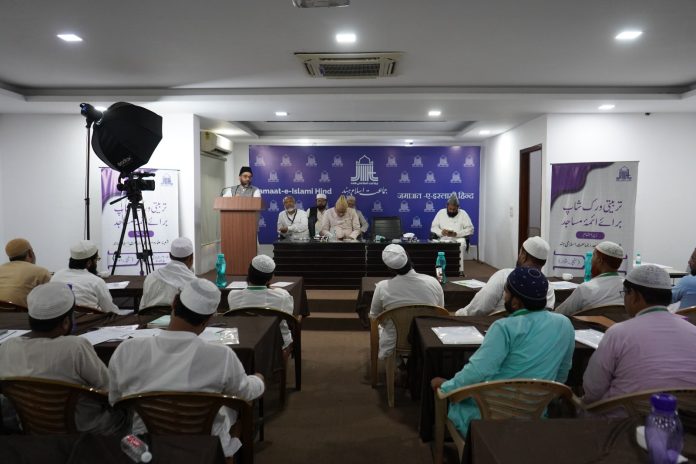– Muhammad Raziul Islam Nadwi
New Delhi: A two-day training workshop for Imams of mosques began at the headquarters of Jamaat-e-Islami Hind here Saturday. A total of 120 imams from all states of the country participated in it. Jamaat-e-Islami Hind administers several thousand mosques across the country. Selected imams from each state were invited to attend this gathering.
At the beginning of the inaugural session, this scribe explained the purpose and objectives of the workshop. Then Maulana Waliullah Saeedi Falahi, Deputy Ameer of Jamaat, delivered the keynote address on “The Comprehensive Role of Mosques.” He said that nowadays, apart from the five daily prayers and the Friday prayer, no other activities take place in mosques. In fact, the mosques are often closed immediately after prayers. However, during the time of the Prophet Muhammad ﷺ and in the early periods of Islam, many educational, training, social, and welfare activities were carried out in mosques. He elaborated in detail on what kinds of educational and training programmes could be organised in mosques in addition to prayers, even in the present era.
Maulana Muhiuddin Ghazi, Secretary of the Tasneefi Academy, spoke on “Some Aspects of the Development of the Imam and Khateeb’s Personality.” He said that the imam is the central personality of the mosque, which itself is a central place. He must recognise his status and develop himself in such a way that he can guide worshippers in legal and jurisprudential matters, maintain strong connections with the people, make recommendations on their behalf when needed, resolve their disputes, and provide counselling as and when required.
In Kerala, there are more than 700 mosques under the administration of Jamaat-e-Islami Hind, managed under the name of the Mosque Council. A strong and high-quality administrative system has been established at the state level. Maulana Abdul Hakeem Nadwi, Secretary of the Kerala Zone, introduced the activities of the council in detail. He outlined the educational, social, and welfare work being carried out under the council’s supervision.
Mr. Muhammad Iqbal Mulla, Director of Expansion and Strengthening of Jamaat, delivered a talk titled “Mosque – An Effective Means of Introducing Islam to Fellow Citizens.” He said that there are many misconceptions about Islam and mosques among fellow citizens. Efforts should be made to invite them to the mosque on various occasions, such as organising programmes during Iftar, Eid al-Fitr, and Eid Milad-un-Nabi. A Mosque Visit programme should be organised where visitors are introduced to the mosque, the prayer, and Islam in general, and are provided with copies of Qur’an translation and introductory literature on Islam.
An important session was held on “How to Protect Mosques in the Current Situation?” Advocate Wajeeh Shafiq, Advocate-on-Record at the Supreme Court and former Standing Counsel of the Delhi Waqf Board, explained the legal aspects of mosque protection and answered the workshop participants’ questions in detail.
The second day of the Training Workshop was also marked by a series of important sessions.
After a hadith reminder by Mr. Shabbir Alam, Secretary of Jamaat, Dr. Rizwan Ahmad Rafeeqi delivered a talk titled “Mosques and Imams: Some Glaring Models from the Muslim World.” He presented examples of notable and prominent mosques of the present era – including Al-Masjid Al-Kabir in Kuwait, Fatih Mosque in Istanbul, East London Mosque (UK), and Noor-e-Ilahi Mosque in Pune (India) – where, in addition to regular prayers, a variety of educational and training activities are conducted.
The second speech was delivered by this scribe on “The Multifaceted and Revolutionary Role of Mosques in the Best Eras (Khair al-Qurūn).” I explained that during the Prophet’s ﷺ era and the early centuries of Islam, mosques were dynamic centres. They played a pivotal role in individual moral development, the promotion of education, social reform, and welfare work – with active participation from women as well.
Ameer Jamaat, Er. Syed Sadatullah Husaini, delivered a talk on “The Role of Imams in Social Reform.” He discussed certain prevalent evils in the Muslim society, explained their root causes, and presented strategies for their removal. He concluded by highlighting the responsibilities of Imams in this context.
 Er. S. Aminul Hasan, Deputy Ameer of Jamaat, conducted a workshop titled “How to Make the Friday Sermon More Effective?” He pointed out some weaknesses in current sermons, advised avoiding them, and explained the steps for preparing a sermon. He outlined the essential features of an ideal sermon. His presentation effectively fulfilled the objectives of the workshop.
Er. S. Aminul Hasan, Deputy Ameer of Jamaat, conducted a workshop titled “How to Make the Friday Sermon More Effective?” He pointed out some weaknesses in current sermons, advised avoiding them, and explained the steps for preparing a sermon. He outlined the essential features of an ideal sermon. His presentation effectively fulfilled the objectives of the workshop.
In the final session, reports were presented on the ongoing work related to mosque organisation and Friday sermons in various states under the aegis of Jamaat. Mr. T. Arif Ali, Secretary General of Jamaat, analysed the reports and offered guidance for future improvements.
In his concluding address, the Ameer of Jamaat highlighted the importance of mosques in Muslim communities and reminded imams of their noble status and responsibilities. He emphasised that the divine duty assigned to the Prophet Muhammad ﷺ – recitation of the verses, purification of souls, and teaching of the Book and wisdom – also applies to scholars and imams as his successors.
All participants were presented with complimentary literature, including the new book “Friday and Eid Sermons” by Maulana Syed Jalaluddin Umri, the compiled work “The Status of the Mosque in Islam” by Maulana Syed Ahmad Urooj Qadri, Khurram Murad’s booklet “Imams and the Future of the Ummah”, Various publications from the Department of Ulama and Mosques, the new textbook “Hamāra Deen” from the Central Education Board, and select publications from Al-Manar Publishing House, New Delhi.
Finally, some participants were invited to share their reflections. Along with their feedback, several suggestions were put forward. With unanimous consent, a “Declaration of the Imams of Mosques” was adopted. This declaration included commitments to make mosques centres of education and training, to avoid disputes, and to support one another in doing good deeds.
Alhamdulillah, it was a highly successful workshop. Participants expressed their appreciation and suggested that such programmes should also be organised at the regional (zonal) level.




